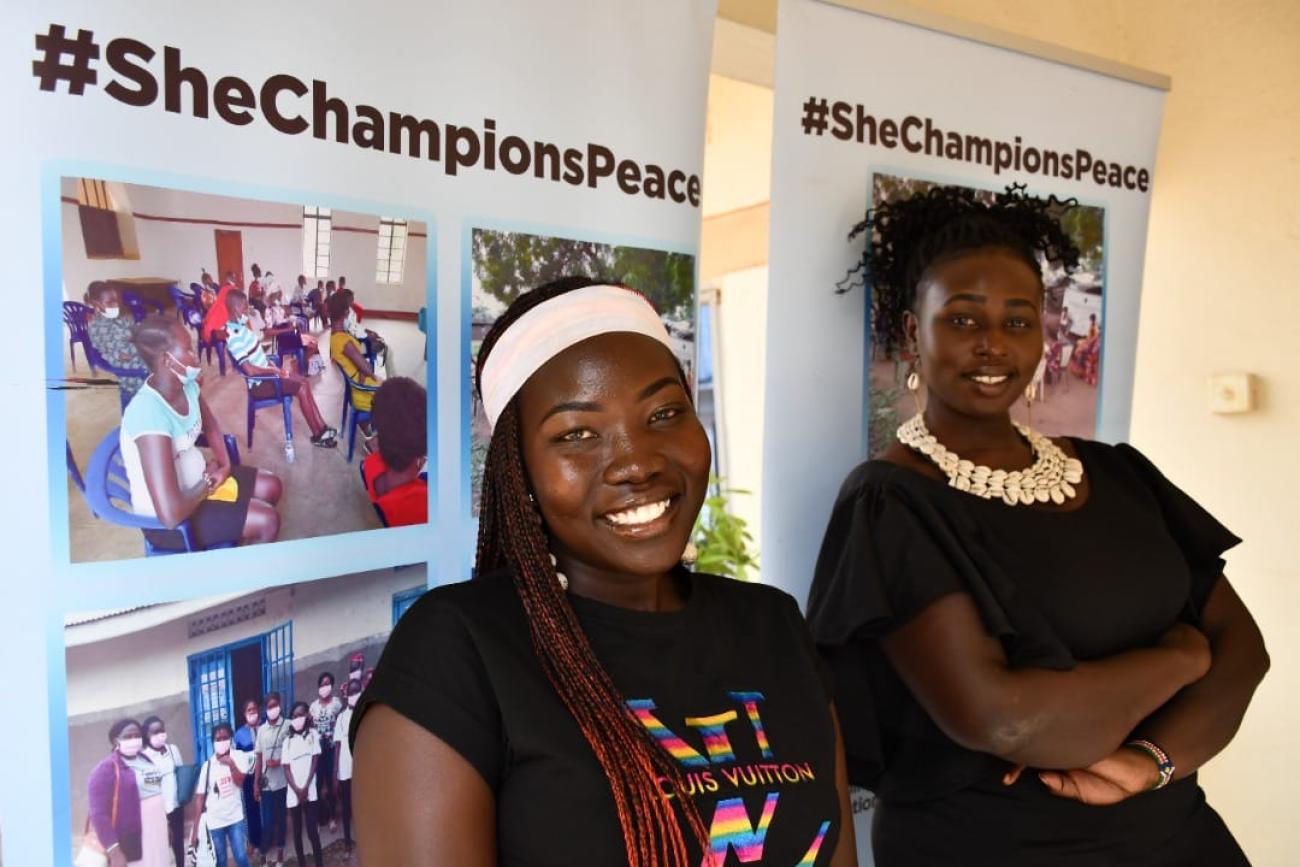Challenging Harmful Gender Norms in South Sudan: A Tale of Three Daring Young Women

Through capacity building, mentorship, and empowerment by the United Nations and its partners in South Sudan, women like Agau, Diana, and Anna, have taken it up
Throughout South Sudan’s decades of armed conflict, women and girls have often been among the most exposed to the devastating impacts of violence. The crisis heightened existing risks that disproportionately affected and continue to affect women in traumatizing ways.
Physical and psychological pain inflicted upon women through actions such as Gender-Based Violence (GBV), and exploitative labor leave an enduring impact on the lives of victims. Women have been deprived of their human rights and have been used as a battleground over which opposing forces show their might.
Through capacity building, mentorship, and empowerment by the United Nations and its partners in South Sudan, women like Agau, Diana, and Anna, have taken it upon themselves to educate women and girls to demand and protect their human rights.
Anna, Diana, and Agau are among 50 young women who received training and mentorship on peacebuilding, mediation, and mentorship through a Search for Common Ground program called “Strengthening Young Women’s Participation in Local and National Peace Processes”.
This program was implemented with support from the United Nations Peacebuilding Fund, coordinated by the United Nations Office of the Resident Coordinator. The program equips young women with the collaborative skills to confront one of the starkest challenges facing South Sudan: violent conflict. The program is helping to strengthen the ability of young women like to collaboratively lead local and national-level peace efforts, transform attitudes and behaviors about young women and empower youth to promote peace and security.
Thanks to the skills acquired from this program, Anna won an award for ‘Future Africa Leaders’ and together with Agau, they represented South Sudan at the High-Level Global Conference on youth’s inclusive peace process organized by the Office of the Secretary General’s Envoy on Youth.
The three young women have taken it upon themselves to educate women and girls to demand and protect their human rights.
They conduct door-to-door campaigns in communities, schools, churches, and other public gatherings. They disseminate information on the dangers of early marriage, the importance of girl child education, and the dangers of gender-based violence among other issues affecting women and girls’ ability to thrive in society. Additionally, they also share peacebuilding messages and encourage communities to live together and learn strategies to resolve community conflicts.
Agau, who is currently a student of Peace and Justice Studies at the University describes her typical day: “After my lectures at the University, I walk around to share with my colleagues, both men and women the value of women’s rights and the benefit of empowering women.”
“My mission is to ensure that young girls are supported to attain an education and be better positioned to serve the nation instead of being dragged into unhealthy, unproductive practices like early marriage, and GBV among others, which exposes them to more risks, and deprives them of their ability to contribute to a healthy, and productive society,” Agau explains.
For Diana, her target is to empower young people, especially girls with disabilities to become aware of their rights despite their impairments.
According to a Human Rights Watch report published in 2016, about 1.2 million people in South Sudan have a disability. Stigma is still a major challenge that has rendered people with disabilities very vulnerable and marginalized as most of them are excluded from all levels of engagement and contribution in society.
Diana is currently engaging girls with disabilities, to explore opportunities for them to get an appropriate education, know their rights and hold duty bearers accountable.
“Using the skills, I acquired from training and interaction with colleagues, I am able to access villages, schools and mass media to engage and speak to young people especially girls with disabilities on their rights and the possibility of a brighter future if they are more aware of opportunities available to them and of their rights to these opportunities”, explains Diana, with a beaming smile, a sense of self-satisfaction and love for what she does.
Diana continues to narrate that seeing the process of self-awareness among these young people, is a great motivation for her work. She also engages women and men working in the market and local restaurants in Juba on women rights and the role both men and women can play in ensuring that the human rights of girls and women are protected.
As a child, Anna watched with distress the preferential treatment that boys in her community received in comparison to girls, the roles and decisions that favored boys while subduing girls and the impact these family and community decisions had on growing children, both boys and girls.
“I always wanted to do something about it but did not know where or how to start,” she states.
But the training on mentorship, advocacy and mediation reignited her passion and gave her an opportunity to access and create relations with Radio stations in Juba.
“With this knowledge and empowerment, I started to broadcast my Poems which mostly focused on community behavior, exposing the abuse of girls’ rights, and sending out the messages for empowerment and the ability to speak up against all sorts of abuse,” Anna explains.
Armed with skills and tools of advocacy, the three young women have become powerful uniting instruments in their communities gathering support for the extremely vulnerable and marginalized sections of the community. They work with authorities to promote fairness and harmony through mediating peace among conflicting parties and influencing a change in attitudes that negatively impact women’s ability to contribute to peacebuilding and development processes.







